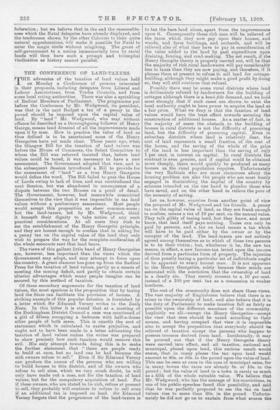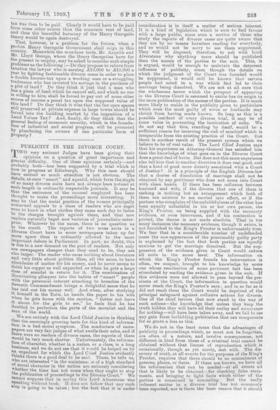THE CONFERENCE OF LAND-TAXERS.
THE advocates of the taxation of land values held on Monday a Conference of persons interested in their proposals, including delegates from Liberal and Labour Associations, from Trades Councils, and from some local rating authorities. There was also a sprinkling of Radical Members of Parliament. The programme put before the Conference by Mr. Wedgwood, its president, was that in the next Budget a tax of a penny in the pound should be imposed upon the capital value of land. By " land " Mr. Wedgwood, who may without offence be described as a thoroughgoing follower of Henry George, means land divested of all the improvements made upon it by man. How in practice the value of land as thus defined is to be ascertained none of the Henry Georgeites have yet made clear. Three years ago, when the Glasgow Bill for the taxation of land values was before the House of Commons, the Select Committee to whom the Bill was referred insisted that, before land values could be taxed, it was necessary to have a new assessment. The Government adopted that view, and in the subsequent Session introduced a Bill to provide for the assessment of " land " as a true Henry Georgeite would define the word. The Bill failed to pass the House of Lords owing to lack of time, and was reintroduced the next Session, but was abandoned in consequence of a dispute between the two Houses on a point of detail. The Government, however, had meanwhile committed themselves to the view that it was impossible to tax land values without a preliminary assessment. Most people would accept this proposition as sheer common-sense ; but the land-taxers, led by Mr. Wedgwood, think it beneath their dignity to take notice of any such practical considerations. At all costs they wish to see the establishment of the Henry Georgeite principle, and they are honest enough to confess that in asking for a penny tax on the capital value of the land they only wish to prepare the way for the complete confiscation of the whole economic rent that land bears.
The views of this gallant little band of Henry Georgeites are, however, less important than the views which the Government may adopt, and may attempt to force upon the country. A great clamour has gone up from the Radical Press for the taxation of land values, partly as a means of meeting the coming deficit, and partly to obtain certain ulterior advantages which many people imagine can be secured by this method of taxation.
Of these secondary arguments for the taxation of land values, the most specious is the proposition that by taxing land the State can facilitate the provision of houses. A Striking example of this popular delusion is furnished by a letter which Sir Edmund Verney writes to the Daily Reiss. In this letter it is stated that at a meeting of the Buckingham District Council a case was mentioned of a girl of fifteen occupying a bedroom with half-a-dozen other people of both sexes. This is exactly the sort of statement which is calculated to excite prejudice, and ought not to have been made iu a letter advocating the taxation of land values unless the writer was prepared to show precisely how such taxation would remove this evil. His only attempt towards doing this is to make the further statement that " there are people ready to build at once, but no land can be had because the rich owners refuse to sell." Even if Sir Edmund Verney can produce the names of the persons who are willing to build houses in this district, and of the owners who refuse to sell sites, which we very much doubt, he will only have made out a case, not for the taxation of land values, but for the compulsory acquisition of land. For if these owners, who are stated to be rich, refuse at present to sell, they probably will continue to refuse to sell even if an additional tax is imposed on land. Sir Edmund 'Verney forgets that the programme of the land-taxers is to tax the bare land alone, apart from the improvements upon it. Consequently these rich men will be relieved of the taxes which they now pay upon their houses, and woods, and farm buildings, and orchards, and will be relieved also of what they have to pay in consideration of the value added to the laud by past expenditure upon draining, fencing,'and road-making. The net result, if the Henry Georgite theory is properly carried out, will be that the majority of rich rural landowners will pay considerably less in taxes than they are now paying,,and therefore, if it pleases them at present to refuse to sell jand for cottage- building, although they might make a good profit by doing so, they will still continue that refusal.
Possibly there may be some rural districts where land is deliberately refused by landowners for the building of cottages although there is a bonfi-fide demand, and we hold most strongly that if such cases are shown, to exist the local authority ought to have power to acquire the land at a fair price. What we deny is that the taxation of land values would have the least effect towards securing the construction of additional houses. As a matter .of fact, in the majority of cases the obstacle to the building of houses in rural districts is not the difficulty of procuring land, but the difficulty of procuring capital. Even in suburban districts where laud is relatively dear, the cost of land represents a small fraction of the cost of the house, and the saving of the whole of the price of the laud is less important than the savitic, of only 1 per cent. iu interest on capital. In rural districts the contrast is even greater, and if capital could be obtained more cheaply, there would quickly be produced as many houses as the rural population requires. Unfortunately the very Radicals who are most clamorous about the housing problem are also the people who are most busily engaged in diminishing the capital of the country by schemes intended on the one hand to plunder those who have saved, and on the other hand to relieve the poor of the necessity of saving.
Let us, however, examine from another point of view the proposal of Mr. Wedgwood and his friends. A penny tax on the capital value of land, as they are frank enough to confess, means a tax of 10 per cent. on the annual value. They talk glibly of taxing land, but they know, and must know, that land itself pays nothing. Taxes can only be paid by persons, and a. tax on land means a tax which will have to be paid either by the owner or by the occupier of the land. The land-taxers are not entirely agreed among themselves as to which of these two persons is to be their victim ; but, whichever it be, the new tax means, in effect, a new Income-tax levied upon the income derived from a particular form of property. The injustice of thus penally taxing a particular set of individuals ought to be apparent to every honest man. It is not apparent to the Henry Georgeites, solely because their minds are saturated with the conviction that the ownership of land is a deadly sin. They merely consent to a 10 per cent. instead of a 100 per cent. tax as a concession to weaker brethren.
The rest of the community does not share these views. The vast majority of Englishmen .believe that there is no crime in the ownership of land, and also believe that it is the duty of Parliament to make taxation fall as fairly as possible upon the different members of the community. wo all—except the Henry Georgeites—accept the view that men should be . taxed according to their means, and having accepted that view it is impossible also to accept the proposition that everybody should be relieved of taxation except the persons who happen to possess incomes derived from land. Incidentally,• it may be pointed out that if the Henry Georgeite theory were carried into effect, and all taxation, national and municipal, placed upon land, this curious result would ensue, that in many places the tax upon land would amount to 40s. or 50s. in the pound upon the value of land. This can be seen at once in the case of municipal rates, for in many towns the rates • are already 8s. or 10s. in the pound ; but the value of land in a town is rarely as much as a fifth of the whole rateable value. We believe that Mr. Wedgwood, who has the courage of his convictions, in one of his public speeches faced this possibility, and said that he was perfectly prepared to see the tax on land values rise to more than 20s. in the pound. Unfortu- nately he did not go on to explain from what source the tax was then to be paid. Clearly it would have to be paid from some other source than the economic rent of land, and thus the beautiful harmony of the Henry Georgeite theory would be again destroyed. That, however, is a problem for the future, when a perfect Henry Georgoite Government shall reign in this country. Meanwhile the mundane tools, Mr. Asquith and Mr. Lloyd George, whom the Henry Georgeites have for the present to employ, may be asked to consider such simple problems as the following :—Do they propose to relieve from taxation the lawyer who .is earning £10,000 to £15,000 a year by fighting fashionable divorce cases iu order to place a double Income-tax upon a working man or a struggling tradesman who has invested his savings in the purchase of a plot of laud ? Do they think it just that a man who has a piece of land which he cannot sell, And which no one is willing to hire, shall be forced to pay out of some other source of income a penal tax upon the supposed value of this land ? Do they think it wise that the few open spaces still preserved at private expense in large towns should be forced into the building market by the imposition of a Land Values Tax ? Aud, finally, do they think that the general feeling of economic security, 'which is the founda- tion of industrial and social progress, will be promoted by plundering the owners of one particular form of property ?










































 Previous page
Previous page